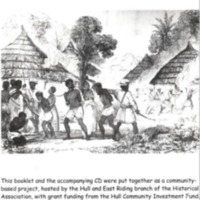
Songs of Slavery
The Songs of Slavery CD and booklet were produced by a community-based project, led by the Hull and East Riding branch of the Historical Association. The project was part of the Wilberforce 2007 initiative in Hull. Songs of Slavery recorded 19 songs relating to slavery, alongside six short narratives. Most of the songs date from the mid-19th century and were originally composed and sung by enslaved peoples. Some were based on religious beliefs, others also contained coded messages to aid escape and resistance. The Songs of Slavery tracks were sung or narrated by local choirs, singers and musicians, together with students from local schools and colleges.
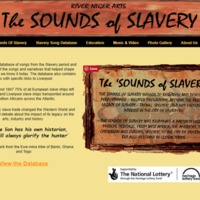
The Sounds of Slavery
The Sounds of Slavery was a project by the performance and visual arts group River Niger Arts to research, record and develop a performance-related programme around the musical heritage and legacy of slavery. The project took particular interest in these themes in relation to the City of Liverpool, but also addressed them in global terms. The project created a database of songs and narratives from the period of slavery. Members of the River Niger Orchestra also performed at a Sounds of Slavery performance at Liverpool Hope University. Some of the songs performed included 'The Chase', 'No More Auction Block' and the African American spiritual 'The Jubilee Song'. The project was accompanied by a series of performance and visual arts education workshops with schools.
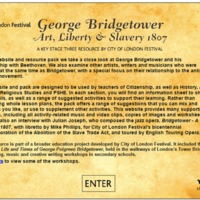
George Bridgetower: Art, Liberty and Slavery 1807
In this website and Key Stage 3 Resource Pack, the City of London Festival examined the work of the Afro-European violinist George Bridgetower (1778-1860) and, in particular, his relationship with the composer Ludwig van Beethoven. The resource also explored the role of other artists, writers and musicians who were active at the same time as Bridgetower, with a special focus on their relationships to the anti-slavery movement. The website provided music, video clips and worksheets, alongside an interview with Julian Joseph, composer of the jazz opera Bridgetower - A Fable of 1807, toured by English Touring Opera. The resource was part of a broader education project developed by City of London Festival, which included the exhibition, 1807: The Life and Times of George Polgreen Bridgetower, held in the walkways of London's Tower Bridge. The education project also included storytelling, music and creative writing workshops in secondary schools.
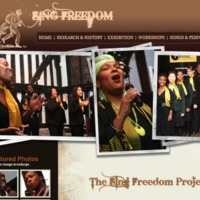
Sing Freedom
The Sing Freedom project was based on the Spirituals sung by African peoples as a response to being enslaved. The generally Christian songs often contained instructions about escape and resistance. The project was a collaboration between Kainé Management Group, Leicester African Caribbean Arts Forum, Leicester City Council Arts & Museum Service and Library Service. It included research into the songs, a touring exhibition, and performances. A series of song writing workshops for young people in partnership with BBC Radio Leicester aimed to give each participant an understanding of the effects of slavery and perceptions they have on present day freedom. At Leicester Guildhall Kainé Gospel Choir and friends came together for an evening celebrating the Spirituals, where songs such as The Gospel Train, Wade in the Water and Swing Low Sweet Chariot were sung.
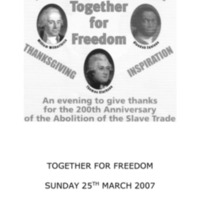
Wilberforce 2007 at Holy Trinity Church
Hull's parish church of Holy Trinity is where William Wilberforce was baptised in 1759. The Church held a number of performances and events throughout 2007. The Together for Freedom commemorative service took place on 25 March 2007, led by the Archbishop of York and featuring the Redemption Gospel Choir from Hull and Middlesbrough. The Freedom Flower Festival took place in June and the Songs of Freedom Music Festival in September, featuring performances by leading gospel performers and local schoolchildren. The London Community Gospel Choir gave a powerful concert, which highlighted the important role of music in the lives of slaves living on plantations. In August, the Freetown Society of Hull hosted a performance of the Milton Margai School for the Blind Choir from Freetown, Sierra Leone. A Panos photographic exhibition at the Church, Slave Britain, revealed the realities of contemporary human trafficking.
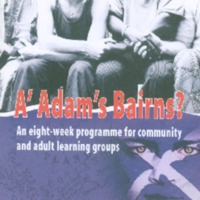
A' Adam's Bairns? Exploring equality and diversity in Scotland past and present
A’ Adam’s Bairns? is an educational resource pack produced in 2007 by a partnership of the National Library of Scotland and the Scottish Development Education Centre (Scotdec). The project explored equality and diversity both past and present, and looked at the attitudes and behaviours which underpinned slavery then and now, such as racism, sectarianism, prejudice and ignorance. The resources and reference materials are aimed at school children and also community and adult learning groups. They made use of material held by the National Library of Scotland and the National Archives of Scotland, and also included contemporary and traditional music produced by Scottish music expert Dr Fred Freeman, including a rendition of 'The Slave's Lament' by Robert Burns. Modules on the programme included slavery, forced movement of people and taking action for change.
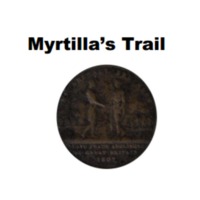
Myrtilla's Trail
Myrtilla’s Trail was developed at Leamington Spa Art Gallery & Museum in partnership with poet Brenda Tai Layton, using objects, images and texts to explore local links with the slave trade. Myrtilla, 'Negro slave to Mr Tho. Beauchamp', is buried in the village of Oxhill in Warwickshire. Apart from her gravestone (dated 1705), she remains anonymous. Warwick District has connections with slave owners, such as the Greatheed family of Guy's Cliffe, sugar plantation owners in St Christopher (St Kitts). This trail around the galleries offered a starting point for exploring these complex and often hidden histories, including busts and documents of the Greatheed family, abolitionist coins, protest songs, and travel posters.
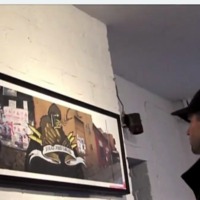
Freedom Song
Freedom Song involved young people from Derby, Leicester and Nottingham creating their own digital musical video shorts to express contemporary social and cultural experiences. The group in Derby looked to develop links to regional history and culture through the study of the songs of oppression and freedom of the slave trade and its musical legacies today. A heritage project involved participants researching music of their ancestors and predecessors in the cultural tradition, exploring the Windrush migrations, oral traditions and the impact of female artists on music cultures in the UK.
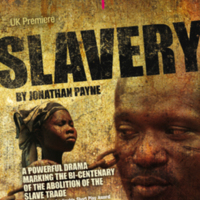
Slavery
A one-act play by Jonathan Payne, 'Slavery' re-tells the personal stories of enslaved Black Americans, using original recordings of interviews conducted by the United States Government's Federal Writers Project in the 1930s. The play brings together a collection of personal testimonials and spirituals (Christian songs created by African slaves in the United States), to explore the consequences of slavery. Presented in 2007 by the cross-cultural London theatre company Tara Arts and directed by Laura Kriefman, the play toured nationally during Black History Month. An Education Resource Pack was produced and drama workshops for schools were held after the performances to explore the issues raised.
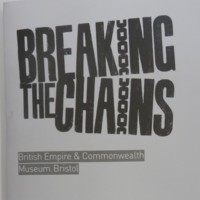
Breaking the Chains
Breaking the Chains opened at the British Empire and Commonwealth Museum to coincide with the bicentenary, and told the story of the British transatlantic slave trade and its abolition. Developed in partnership with Bristol City Council's Museums, Galleries and Archives' Service, the exhibition used artefacts, film and testimony to challenge perceptions about Britain's involvement in the slave trade and its legacy today. It featured a multimedia gallery of digital memories and feelings on the contemporary legacies of the slave trade; interactive sound stations to see and hear personal testimonies and the power of black music; and the ‘Me deya’ gallery, led by Firstborn Creatives, a collection of work from artists and communities who wished to share their creative pieces about the legacies of the slave trade. Associated events included African music for children, community dance events and public debates.
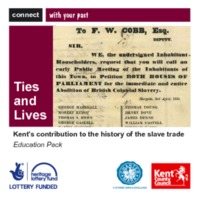
Ties and Lives: Kent and the Slave Trade
Ties and Lives: Kent and the Slave Trade was a project run by Kent Archives in collaboration with Creative Partnerships Kent and the educational charity Music for Change. It aimed to show how the county’s historic collections could be used by young people to support their education, particularly on contemporary issues. An education pack provided a range of sources, research and information for secondary schools about the abolition of slavery. Music for Change artists visited schools in the county and through performance workshops encouraged students to interpret stories found in the archive and local history collections and explore the impact of the transatlantic slave trade and the abolitionist movement on the past lives of Kentish people. There was a particular focus on music and dance originating from the traditions of enslaved peoples.
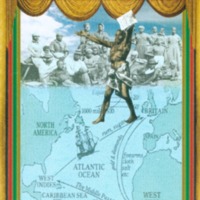
Leeds Bicentenary Transformation Project
This collaborative community initiative celebrated African and Caribbean culture in Leeds, with a focus on commemorating the Abolition Act by 'highlighting African achievement, liberation and aspirations'. New exhibitions, publications and resources were produced and over 100 bicentenary events organised under different themes: Education and Museums; Arts and Carnival Culture; Churches and Abolition; Legacy; Black History and Community Development; Media and Communications. Highlights included the photographic exhibition and pamphlet 'From Abolition to Commonwealth', which remembered indentured labour in Africa and the Caribbean after 1807, and the 40th anniversary of Leeds West Indian Carnival, with themes that highlighted heritage, liberation, respect and freedom. Project outputs included an education pack, black history classes, concerts, church services, lectures and performances.